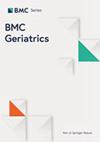Approximately half of the nursing students confirmed their willingness to participate in caring for older people: a systematic review and meta-analysis
IF 3.4
2区 医学
Q2 GERIATRICS & GERONTOLOGY
引用次数: 0
Abstract
Global population aging poses a significant global challenge, necessitating an increased demand for proficient caregivers specialized in elderly care. In our study, a systematic review and meta-analysis were conducted to synthesize the evidence concerning nursing students’ willingness to participate in caring for older people. Eligibility criteria focused on cross-sectional studies involving nursing students’ willingness to participate in caring for older people and were reported in English or Chinese. PubMed, Web of Science, Embase, Cochrane Library, China National Knowledge Infrastructure (CNKI), and WANFANG databases were searched from inception until July 24, 2022. The methodological quality assessment in the included studies was evaluated using the AHRQ instrument. The pooled effects of the nursing students’ willingness to participate in caring for older people were computed using a random-effects model. Funnel plots and Egger’s test were employed to evaluate publication bias. Meta-regression and subgroup analysis were performed to explore the sources of heterogeneity. Sensitivity analysis was conducted to verify the robustness of the meta-analysis findings. All statistical tests were conducted with Stata 16.0 software. A total of 68 studies of medium or high quality met the eligibility criteria, involving 30,328 nursing students. The rate of nursing students’ willingness to participate in caring for older people was 49.0% (95% CI = 46–53%, I2 = 98.1%, P = 0.000). The results of meta-regression analysis showed that the following four predictor variables were significantly associated with nursing students’ willingness to participate in caring for older people: experience of living with and caring for older people, nursing as their first choice and their year-level in education, respectively. Subgroup analyses for these four predictor variables revealed the following pooled estimates of nursing students’ willingness: having experience of living with older people (0.54, 95% CI = 0.46–0.62) vs. no such experience (0.38, 95% CI = 0.30–0.46), having experience of caring for older people (0.55, 95% CI = 0.48–0.63) vs. no such experience (0.38, 95% CI = 0.30–0.46), nursing as their first choice (0.54, 95% CI = 0.51–0.58) vs. not their first choice (0.44, 95% CI = 0.35–0.53), being in the first year of nursing education (0.44, 95% CI = 0.34–0.55), second year (0.45, 95% CI = 0.34–0.56), and third and fourth year (0.62, 95% CI = 0.53–0.71). The study found that approximately half of the nursing students confirmed their willingness to participate in caring for older people.The present study can serve as a resource for policymakers to increase the willingness of nursing students to participate in caring for older people.约半数护理专业学生确认愿意参与照顾老年人:系统回顾和荟萃分析
全球人口老龄化是一项重大的全球性挑战,因此需要更多精通老年人护理的护理人员。在我们的研究中,我们进行了系统回顾和荟萃分析,以综合有关护理专业学生参与照顾老年人意愿的证据。资格标准主要针对涉及护理专业学生参与照顾老年人意愿的横断面研究,且研究报告为英文或中文。检索了 PubMed、Web of Science、Embase、Cochrane Library、中国国家知识基础设施(CNKI)和 WANFANG 等数据库,检索时间从开始至 2022 年 7 月 24 日。采用 AHRQ 工具对纳入研究的方法学质量进行评估。采用随机效应模型计算了护理专业学生参与照顾老年人意愿的汇总效应。采用漏斗图和 Egger 检验来评估发表偏倚。进行了元回归和亚组分析,以探索异质性的来源。为验证荟萃分析结果的稳健性,还进行了敏感性分析。所有统计检验均使用 Stata 16.0 软件进行。共有 68 项中等或高质量的研究符合资格标准,涉及 30,328 名护理专业学生。护理专业学生愿意参与护理老年人的比例为 49.0%(95% CI = 46-53%,I2 = 98.1%,P = 0.000)。元回归分析结果显示,以下四个预测变量与护理专业学生参与照顾老年人的意愿有显著相关性:分别是与老年人共同生活和照顾老年人的经历、护理专业是他们的首选专业以及他们的教育年级。对这四个预测变量进行分组分析后发现,护理专业学生参与意愿的综合估计值如下:有与老年人共同生活的经历(0.54,95% CI = 0.46-0.62)与无此类经历(0.38,95% CI = 0.30-0.46);有护理老年人的经历(0.55,95% CI = 0.48-0.63)与无此类经历(0.38,95% CI = 0.48-0.63)。没有此类经验(0.38,95% CI = 0.30-0.46),护理是她们的首选(0.54,95% CI = 0.51-0.58),而不是她们的首选(0.44,95% CI = 0.35-0.53),处于护理教育的第一年(0.44,95% CI = 0.34-0.55)、第二年(0.45,95% CI = 0.34-0.56)以及第三和第四年(0.62,95% CI = 0.53-0.71)。研究发现,约有一半的护理专业学生确认他们愿意参与照顾老年人的工作。本研究可作为决策者的参考资料,以提高护理专业学生参与照顾老年人的意愿。
本文章由计算机程序翻译,如有差异,请以英文原文为准。
求助全文
约1分钟内获得全文
求助全文
来源期刊

BMC Geriatrics
GERIATRICS & GERONTOLOGY-
CiteScore
5.70
自引率
7.30%
发文量
873
审稿时长
20 weeks
期刊介绍:
BMC Geriatrics is an open access journal publishing original peer-reviewed research articles in all aspects of the health and healthcare of older people, including the effects of healthcare systems and policies. The journal also welcomes research focused on the aging process, including cellular, genetic, and physiological processes and cognitive modifications.
 求助内容:
求助内容: 应助结果提醒方式:
应助结果提醒方式:


